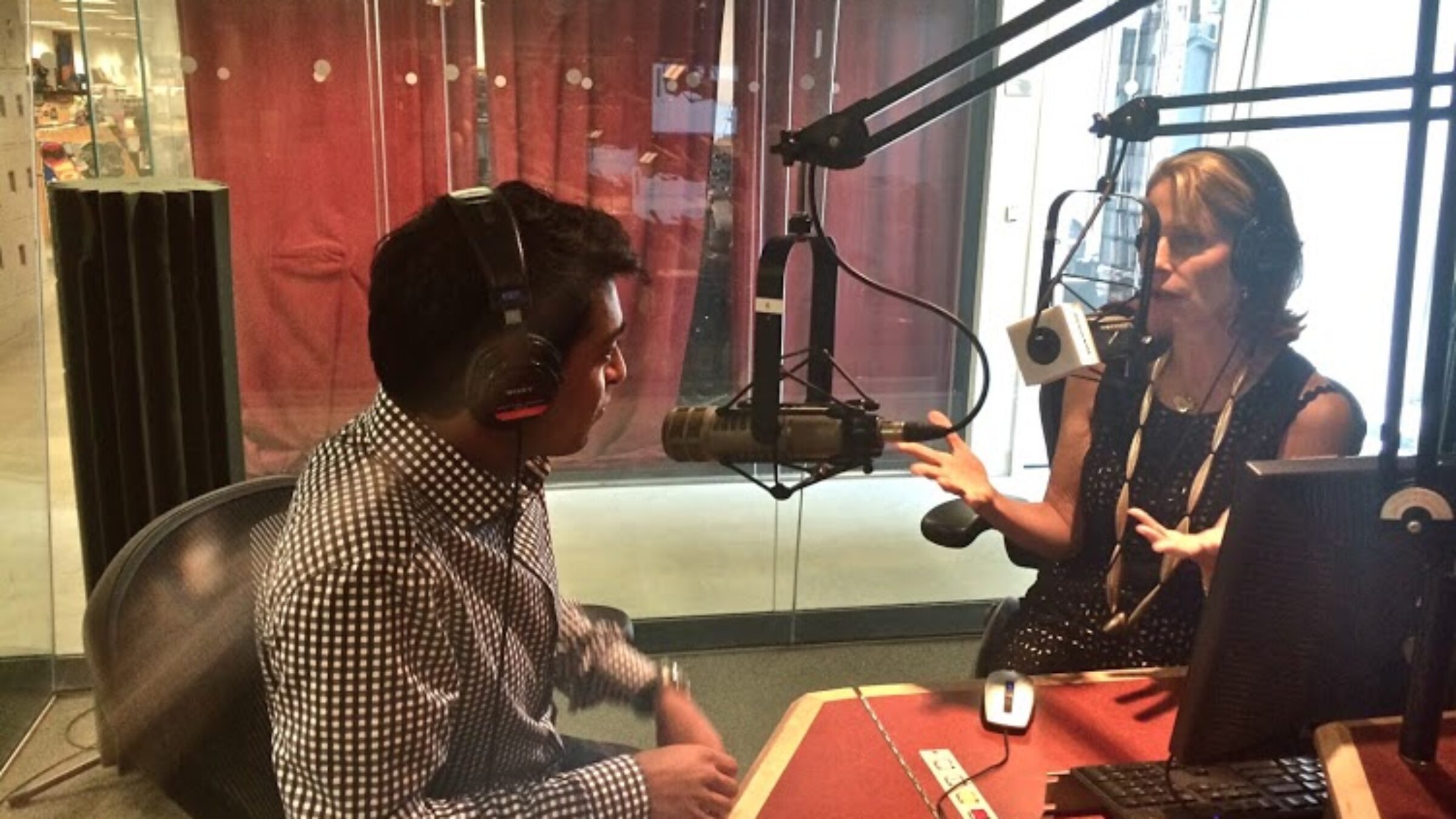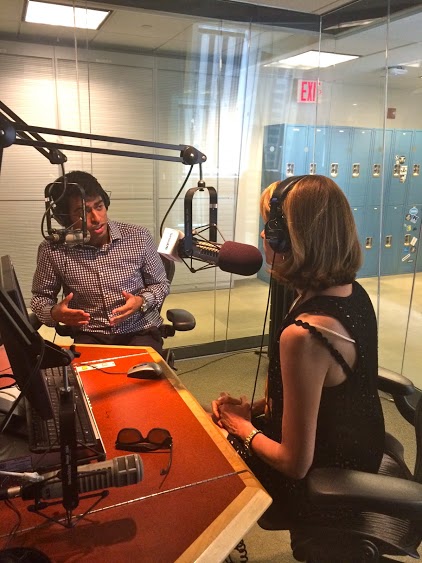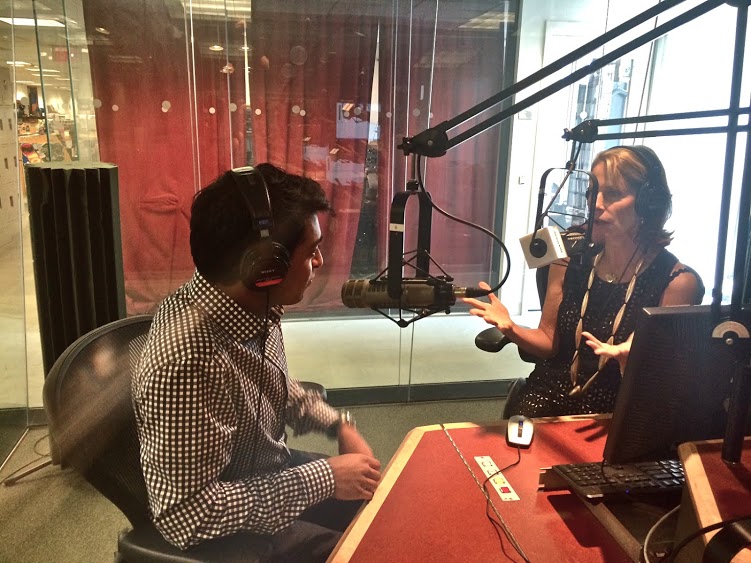MAP joins The Perri Peltz Show at SiriusXM Studios
July 31, 2014
From the New York City studio, Steven Olikara and Perri Peltz discussed how Millennials are redefining the notion of “work” and what their entrance into government will mean for the next decade of leadership.


Continuing their discussion from the Aspen Ideas Festival, MAP President Steven Olikara joined The Perri Peltz Show on Sirius XM radio to discuss the growth and future of Millennials in politics. From the New York City studio, the pair discussed how Millennials are redefining the notion of “work” and what their entrance into government will mean for the next decade of leadership.
“We have the beginning of a generational transition, and the question is how can our generation govern differently and more collaboratively to overcome some of that dysfunction we see in government.”
— Steven Olikara
Olikara described our generation’s evolving perspectives that have led to 94% of Millennial employees want to use their skills for social good. We see that creating social impact is more of a priority than an added benefit for Millennials in their careers. This drive has resulted in Millennials launching collaborative initiatives in areas such as social entrepreneurship, state innovation and open data.
“When you’re younger and thinking about these challenges we’ll inherit, we are less concerned with the rigid ideological battles, and more concerned with what works, and finding solutions that can work for both sides,” remarked Olikara.
“What we’re already seeing right now, with these 30-something’s in Congress that we’ve brought together through the Future Caucus, is that they’re creating a culture of collaboration.”
If you missed the live interview, catch up with our highlights below:

Perri Peltz: Everybody is so fed up with the partisanship that exists and the gridlock that exists in Congress. Are you optimistic at all that the Millennial generation and this [Congressional Future] Caucus, that will foreseeably grow and grow, is going to be able to make any impact on that?
Steven Olikara: I am optimistic, one because we have the potential to be different, and I’ll get into some of the data in a second. The second reason is, more importantly, we have to be different. Because this country is amazing. My parents immigrated from India, so I am first generation American and I know how special the opportunities are here. My parents came here with no connections and very little resources, but we’d talk about the American dream, and today it’s really at risk of being dismantled because of this dysfunction thats happening, because we’re not solving the longer term challenges that we have to address. So I am optimistic about the Millennial generation, because now we have a totally different take on politics, technology and business and I think it’s exactly the perspective we need to improve things. I’ll give one example: Now our generation is over 50% independent. The fastest growing political affiliation is no-party affiliation in our country and the Millennials are leading that. We’re willing to be an a-la-carte generation, in that we’re taking ideas from the left, from the right, from the center, from anywhere as long as it’s enacting solutions, as long as they are making progress.
Then, you look at our Congress today, it is not built with 30 and 40 year olds today. How does that average age (about 58) skew the decisions that are being made for the people of country?
The Congress of 2009-2010 was the oldest Congress in United States history. All the Congresses, the current one, and ones in recent years have all been the oldest. I think that does have an impact. If you look at the policies being made today, they are mostly short-term solutions. They’re kicking the can down the road. One example is the national debt. This continues to accumulate and the burden is going to be shifted onto the next generation, and you haven’t seen the political courage to make those sacrifices. Another issue is climate change. Another one that particularly affects Millennials is this enormous student loan debt crisis, which now exceeds a trillion dollars, exceeds all our credit card loan debt in this country. On student loans, they still don’t have a long term solution for that, every few years we have to re-establish the interest rates on student loans. And this is disproportionately affecting Millennials.
I can understand that if you have a larger Millennial voice in Congress that could change a lot of the thinking and a lot of the policy. Does it impact the gridlock? It certainly doesn’t change ideology necessarily, people might very well still be entrenched on the right or the left, so how does it change gridlock?
The difference is there are a lot of ideas and issues that can be consistent with different ideologies. We’re not saying that you have to relinquish your label, your political persuasion, but finding ideas that resonate with both sides. So for example our Future Caucus members recently introduced a bipartisan bill on social impact bonds, which will leverage private capital for social programs that were traditionally fronted by the government. So this is going to reduce wasteful spending, its going to increase impact. It hits notes on both the left and the right and so as a result we’re getting bipartisan support. It’s better than finding the least common denominator, where you’re giving up on a lot of what you care about to reach an agreement.
We’re actually finding ideas where they resonate with both sides. I think that is the kind of creativity we typically don’t see in policymaking, but we’re starting to see with these Millennials. We’re very entrepreneurial and collaborative, so we’re automatically geared towards seeing what makes the other side tick, even if it’s for a different reason that what gets us going on the same issue.
As much as we talk about the Millennials and distrust of their political leaders and the government, what I think is fascinating, and something that you spoke about before, is that there is some incredible optimism. I’m curious because you wouldn’t necessarily think of those two together: distrust and optimism.
Yes, I think that’s one of the interesting dichotomies we see among this generation. Think about what has happened over the last four years, five years. The Millennial generation came of age and started graduating from college and couldn’t find jobs. We graduated off a cliff into the worst job market we’ve seen in a generation. Youth unemployment today is in the 16% range.
So what are you guys optimistic about?
Yes, exactly this is the funny part of this. As the economy was collapsing back in 2008 and 2009 and we weren’t finding jobs, we were taking things into our own hands. We were becoming entrepreneurs. So now, what’s so fascinating is 54% of the millennial generation identifies as a entrepreneurs, whether they’ve already started a business or want to start a new venture. We’re creating these new jobs at a time when there is not much available to us. I think we have to be optimistic because we have to overcome the tremendous economic challenges that we face.
What I find so interesting now, there’s a recent study 94% of Millennial employees want to use their skills for social good. Another study found that the number one priority for Millennials, as we choose our career is the impact we can have on our local communities and the world. So, at a time when the job market is so bleak, we are still idealistic about making change. As we were just talking about before the show, we are redefining work. Work as a fundamental notion, we think work and impact are totally intertwined now. In other words, it’s not just what we do, or how we’re doing it, it’s what we are doing our job for. That is the third dimension we are now adding to the work life. I think all of that is combined with this notion that we want to have impact and we’re idealistic about making change despite the difficulties.
I think what we have to start seeing is our generation’s best and brightest going into socially productive careers, like public service and entrepreneurship. Jobs that can do well by doing good. That’s why we’re now seeing the explosion of the social entrepreneurial sector. We’re finding business models and market-based solutions that are solving challenges in healthcare, energy, education. And that goes back to again this redefining work. We don’t want to make a lot of money and then give a little to philanthropy at the end of our careers. We want to be giving and working throughout our careers, and that is a paradigm shift.
Talk to us about what a Millennial-led government looks like in 15, 20 years?
Regardless of what we do, by virtue of age, Millennials will take over our government in the next 10 or 15 years. Given that we are doing the work that we do, and there are other political entrepreneurs out there that are trying to reform our democracy, I think in 10 to 15 years you will see a government where the culture is cooperation. Where the next generation will say that on the national debt, on climate change, on education, on all of these issues, if we want America to thrive in the 21st century, we have to find innovative, creative, cross-partisan solutions. Given the challenges we face, we have to do better. I think that’s why in about 10 to 15 years, you’ll see a government that is working together a lot more.
Also, you’ll see a much more tech-savvy government. So one of our Advisory Board members, was the first Chief Technology Officer of the United States: Aneesh Chopra. He came out with a book called Innovative State, and we just had a great interview with him at the National Press Club. Those are the types of things we’re going to see more of. He spearheaded the open data-open government initiative where, for example, anyone can petition the White House online on an issue they care about, regardless of how ludicrous it could be. It could have nothing to do with an issue on the table. If there are enough signatures, the White House must give an official response.
Another thing is opening the data from these large federal agencies, so entrepreneurs can create solutions. For example, our healthcare system: A lot of the health care data is being made available and entrepreneurs are coming in to help improve access. Another one is creating new challenges and competitions. So when the government has a problem, the best solutions often come from the outside, from the private sector. So instead of going to two or three established contractors, we’re now saying we’re going to open up the pool of talent to firms and individuals across the board who can apply. One great example is a tattoo artist came up with one of best solutions to clean up oil after the BP oil spill, and he ended up getting second or third in that competition, and that is a result of these prizes and challenges.
So that is the type of Millennial government we’re going to see, it’s tech-savvy, it’s collaborative, it’s pragmatic, it’s future-focused, it’s innovative. And that’s the type of government I think we all want to see.






Join 1,800+ BIPARTISAN LEADERS NATIONWIDE
Be a part of a network of lawmakers committed to governing effectively, passing more representative public policy, and increasing public trust in democracy.